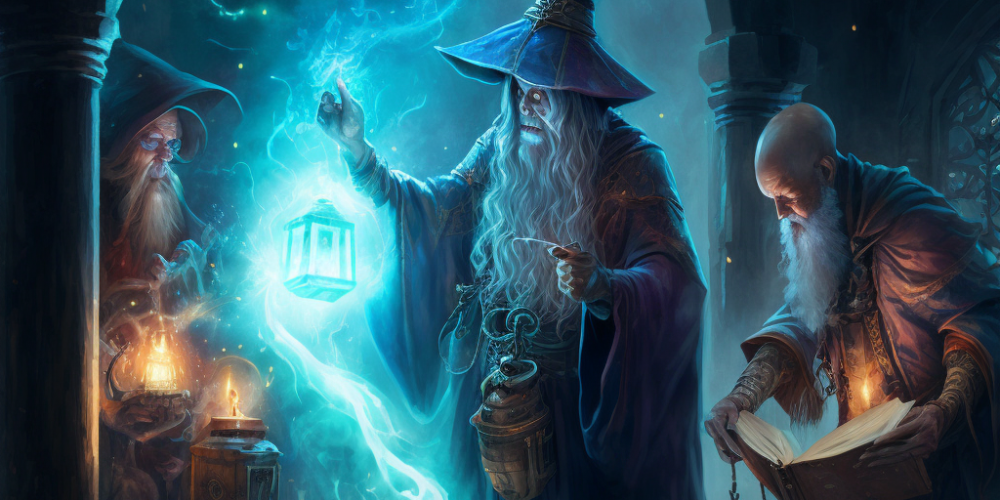Unleashing the Power of Magic in Fantasy Novels: Understanding the Elements and Best Practices for Crafting a Believable Magic System
Magic is a staple element in many fantasy novels, serving as a source of wonder and a tool for the characters to shape their world. From the wizard Gandalf in J.R.R. Tolkien's "The Lord of the Rings" to the witches in J.K. Rowling's "Harry Potter" series, magic has played a crucial role in some of the most beloved fantasy tales of all time.
One of the reasons why magic is so popular in fantasy novels is that it allows for a limitless array of possibilities. In a fantasy novel, magic can be used for anything from simple spells and potions to grand, world-shaping feats. This allows authors to create unique and imaginative settings and plots that would be difficult to accomplish with more realistic constraints.
Another reason why magic is so appealing in fantasy novels is that it allows for the exploration of deeper themes and ideas. For example, in "The Lord of the Rings," the struggle for the One Ring serves as a metaphor for the dangers of unchecked power and the corrupting influence of evil. Similarly, in "Harry Potter," the themes of love, friendship, and sacrifice are explored through the use of magic.
Magic can also be used as a way to give characters special abilities and powers. In many fantasy novels, magic serves as a way to create a sense of hierarchy among characters, with those who possess more powerful magic being more important or respected. This can lead to interesting conflicts and dynamics between characters, as well as opportunities for character development.
There are many different types of magic that can be found in fantasy novels. Some examples include elemental magic, which allows characters to control the elements of nature; divination magic, which allows characters to see into the future or communicate with the dead; and blood magic, which uses the power of life force to fuel spells. Each type of magic has its own unique properties and limitations, and can be used in different ways to create distinct and interesting stories.
Magic can also be used to create a sense of mystery and wonder in a fantasy novel. In many stories, magic is presented as something that is not fully understood or explained, leaving readers to wonder about its true nature and capabilities. This can add an extra layer of intrigue to a story and make the world of the novel feel more alive and dynamic.
Despite all its possibilities and potential, however, the use of magic in fantasy novels must be used carefully. Overuse of magic can make the story less believable, while underuse of magic can make the story feel less fantastical. It's a delicate balance, but when done well, magic can be a powerful tool for creating memorable and captivating fantasy novels.
In conclusion, Magic is an integral part of many fantasy novels. It allows for a limitless range of possibilities in terms of world-building and storytelling, it can be used to explore deeper themes and ideas, and it can add a sense of wonder and mystery to a story. However, it is important for authors to use magic carefully and thoughtfully to create believable and captivating stories.
Another important aspect to consider when incorporating magic into a fantasy novel is the way in which the magic system is designed and presented. Some fantasy novels have a very structured and rigid magic system, while others are more open-ended and flexible.
A structured magic system is one in which there are specific rules and limitations that govern the use of magic. For example, a magic system might only allow certain types of spells to be cast, or require specific incantations or rituals to be performed. This can make the magic system feel more believable, as it gives the impression that there are logical rules and boundaries in place. However, it can also make the magic system feel restrictive, and limit the creativity of the author and characters.
An open-ended magic system, on the other hand, allows for more freedom and flexibility in the use of magic. This type of system often does not have many rules and limitations, and instead allows characters to use magic in a variety of ways. While this can make the magic system feel more exciting and unpredictable, it can also make it feel less believable, as there are no clear rules or boundaries in place.
Another important consideration is how the magic is used by characters. A story could explore how a magic system is discovered and developed or even how it is forbidden and hunted. This can create tension, conflict, and add depth to the story.
Additionally, authors should also consider how the use of magic might affect the world and society in which the story takes place. For example, in some fantasy novels, the use of magic is seen as a normal and accepted part of society, while in others it is a rare and highly valued skill. This can have a big impact on the way the story unfolds, and the kind of characters and conflicts that are present in the story.
In the end, magic is a powerful and versatile tool that can be used to create incredible and captivating fantasy novels. However, it's important for authors to take into account the different elements that go into creating a believable and well-crafted magic system. From the rules and limitations to the way characters use magic and the impact it has on society, the right combination of these elements can create a truly magical story.



